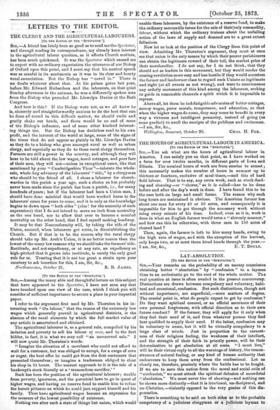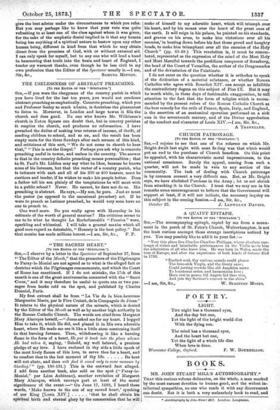LAY-ABSOLUTION.
[To THE EDITOR OF THE "SPECTATOR."] SIR,—Your remarks on the probability of an uneasy conscience obtaining better " absolution " by " confession " to a layman than to an ecclesiastic go to the root of the whole matter. The real question at issue is often evaded in the present controversy. Distinctions are drawn between compulsory and voluntary, habi- tual and occasional, confession. But such distinctions, though not without importance, are superficial,—mere matters of degree. The crucial point is, what do people expect to get by confession ? Do they want spiritual counsel, or an official assurance of their own personal forgiveness, with official direction as to their own future conduct? If the former, they will apply for it only when they feel their need of it, and from whatever person they find best qualified to supply their need. If the latter, confession may be voluntary in name, but it will be virtually compulsory to a large class of minds. Just in proportion to the earnest- ness of their religious feeling, the weakness of their intellect, and the strength of their faith in priestly power, will be their determination to get absolution at all costs. "I must live," will be their virtual reply to all the warnings of history, the remon- strances of natural feeling, or any kind of human authority that endeavours to keep them away from the confessional. Let us clearly see, therefore, precisely where the battle has to be fought. If we are to save this nation from the moral and social evils of "confession," we must attack the spiritual delusion of sacerdotal "absolution." We must never tire of showing—and nothing can be shown more distinctly—that it is irrational, un-Scriptural, and un-Christian,—violently opposed to the very genius of this dis- pensation.
There is something to be said on both sides as to the probable competency of a- judicious clergyman or a judicious layman to give the best advice ender the circumstances to which you refer. But you may perhaps like to know that your vote was quite refreshing to at least one of the class against whom it was given, 'for the sake of the emphatic denial implied in it that any human being has anything of a spiritual nature to bestow upon any other human being, different in kind from that which he may obtain -direct from the promises of God, with or without external aid. I can only speak for myself, but to any one who will lend a hand in hammering that truth into the brain and heart of England, I 'tender my warmest thanks, even though he be less civil to my own profession than the Editor of the Spectator usually is.—I am,







































 Previous page
Previous page